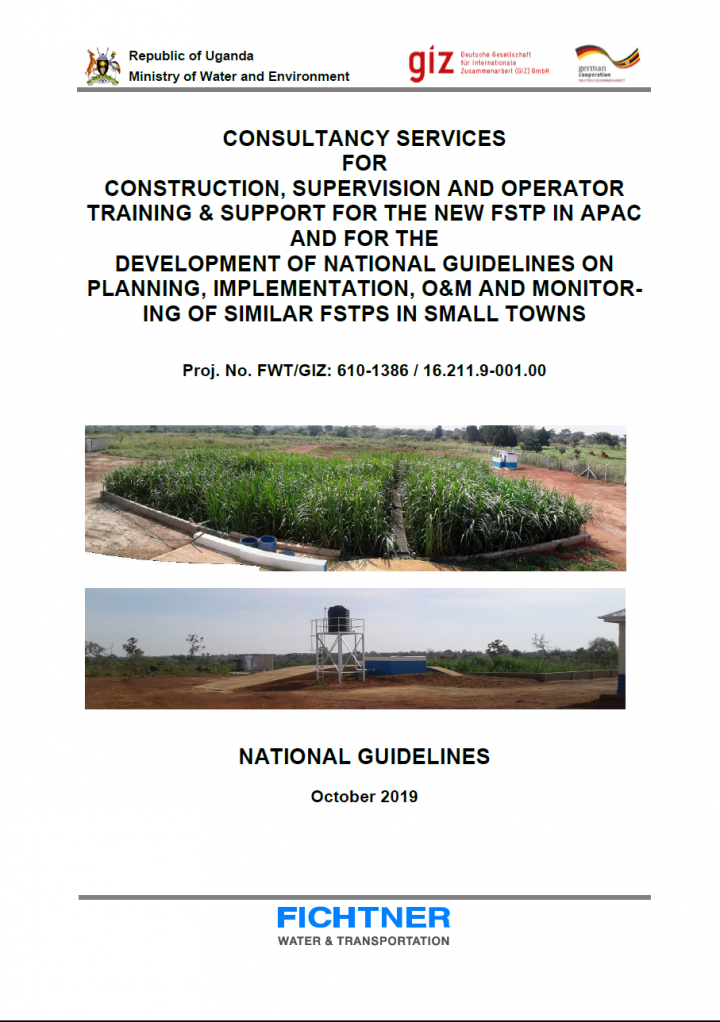National Guidelines on Planning, Implementation, O&M and Monitoring of FSTPS in Small Towns - Consultancy Services
Koehl, F., Spitzer, A. (2019)

Published in: 2019
Pages: 159
Publisher:
Fichtner Water & Transportation GmbH, Republic of Uganda - Ministry of Water and Environment, Deutsche Gesellschaft für internationale Zusammenarbeit (GIZ) GmbH,
Author:
Koehl, F., Spitzer, A.
Uploaded by:
SuSanA Admin
Partner profile:
Deutsche Gesellschaft für Internationale Zusammenarbeit (GIZ) GmbH
2227 Views
80 Downloads
Location of library entry
Summary Guidelines:
German Development Cooperation implemented by GIZ supported the Ugandan Ministry of Water and Environment in developing the National Guidelines for the planning, implementation, O&M and monitoring of small FSTPs (up to about 5,000 m³/a). It is expected that these Guidelines will contribute to enhance the cost efficiency and sustainability of FSTP investments by ensuring that they are based on high-quality standards that reflect both the international state of the art and the best practices identified for Uganda. The intention of the present Guidelines is to provide practical guidance to key actors: Planners and decision-makers, Designers and engineers, Utilities, Authorities in charge of monitoring and regulation enforcement, on key stages of a FSTP project lifecycle including operation: 1. Planning, 2. Detailed design, 3. Authorizations, 4. Construction, 5. Hand over and agreements, 6. O&M, 7. Monitoring. It is also intended to facilitate a strategic, integrated planning process and to anchor sector policies in implementation practice. However, most of the stages addressed by these Guidelines remain individually relevant. Thus O&M and monitoring aspects are for example relevant for FSTPs that already exist. The Guidelines provide concrete figures where appropriate, but only general guidance on design processes and procedures or references to other documents and standards in those cases where discussing the details would go beyond the scope of this format.
The Guidelines can be complemented in the future with: Guidelines for medium and larger FSTP capacity. And a technical manual, even if the present document already includes essential design aspects.
Background:
With its “Reform of the Urban Water and Sanitation Sector Programme” (RUWASS) and the successor program “Enhanced Water Security and Sanitation Programme” (ENWASS) GIZ aims at contributing to sustainably improve the access to adequate and equitable sanitation services in Uganda.
Within this context, GIZ together with USAID spearheaded a two years sanitation project to promote the development and implementation of TSPs in 6 selected towns in Lango subregion in Northern Uganda:
- In Oyam District: Oyam, Kamdini and Loro.
- In Apac District: Aduku, Ibuje and Apac.
This sanitation project was implemented in close cooperation with Water and Sanitation Development Facility North (WSDF-N), which is a devolved unit of the Ministry of Water and Environment (MWE) under the Directorate of Water Development (DWD).
It resulted in particular in Town Sanitation Plans (TSPs) in 2016 but other activities were also implemented (e.g. in schools). TSPs included a detailed baseline survey (households and institutions) and resulted in a list of measures to be implemented. One of Apac TSP’s measures included the construction of a new FSTP, whose construction ended in 2018.
Bibliographic information
Koehl, F., Spitzer, A. (2019). National Guidelines on Planning, Implementation, O&M and Monitoring of FSTPS in Small Towns - Consultancy Services. Fichtner Water & Transportation GmbH, Republic of Uganda - Ministry of Water and Environment, Deutsche Gesellschaft für internationale Zusammenarbeit (GIZ) GmbH,
Filter tags
English Guidelines and manuals Practitioners Sub-Saharan Africa















